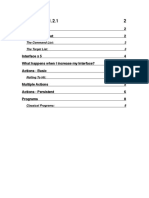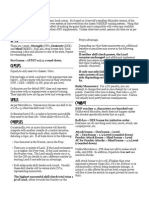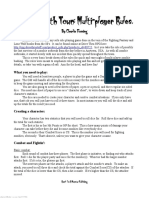Goblin Punch Goblin Guts v2
Goblin Punch Goblin Guts v2
Uploaded by
Omen123Copyright:
Available Formats
Goblin Punch Goblin Guts v2
Goblin Punch Goblin Guts v2
Uploaded by
Omen123Original Title
Copyright
Available Formats
Share this document
Did you find this document useful?
Is this content inappropriate?
Copyright:
Available Formats
Goblin Punch Goblin Guts v2
Goblin Punch Goblin Guts v2
Uploaded by
Omen123Copyright:
Available Formats
Goblin Guts v2
GLOG FOR THE GLOG GOD
By Arnold Kemp at Goblin Punch
Shared under a Creative Commons Attribution-NonCommericial-ShareAlike Unported 3.0 License
Table of Contents
Fighter
Thief
Barbarian
Acrobat
Mono-Class Parties
Mono-Class Campaigns
The Fighter Party: I Can Read You Like a Book
The Fighter Campaign: Mercenaries
The Thief Party: Treasure Hunters
The Thief Campaign: Gang of Thieves
The Barbarian Party: Superstitious
The Barbarian Campaign: Settlement
The Acrobat Party: Cowards
The Acrobat Campaign: Circus
The Orc Party - You Are Orcs
The Orc Campaign - Pariahs
The Peasant Party - Stay Humble
The Peasant Campaign - Pilgrimage
goblinpunch.blogspot.com CC BY-NC-SA 4.0 1
Purpose
This is an incomplete document. It’s meant to work together with the current GLOG,
where it replaces pre-existing class templates. (Unless you like the old ones better, of
course.)
The Base Adventurer
The base adventurer is the chassis that we bolt templates onto. Think of it as Indiana
Jones minus the archeologist. Still very capable, just not specialized.
Level HP Attack MD Helpfuls
1 Con +1 1 0
2 Con + 2 +2 2 0
3 Con + 4 +3 3 0
4 2 * Con +4 4 0
+1 Lvl +0 per Lvl +0 per Lvl +0 per Lvl +1 per Lvl
Attack is based on level.
Defense is based on armor.
Saves are based on Stat checks
● Cha for magic.
● Dex for dodging things that ignore armor.
● Con for poisons and such.
Movement is +5.
Stealth is a Dex check.
goblinpunch.blogspot.com CC BY-NC-SA 4.0 2
Everyone is Magic
Yes, everyone gets magic dice (MD) now. They work just the same as they do for
wizards. They are six-sided dice that are depleted on a 4-6 result, and return after a
good night’s sleep. (There’s no penalty for rolling doubles or triples, though.)
I’ve marked class abilities with “(MD)” if MD are required to use that ability, and “(MD
Optional)” if it is possible to use that ability without investing any MD. If MD are used
to give a bonus to another roll, you choose how many MD you want to invest prior to
making that roll.
There is no fine distinction between magic and non-magic in Centerra. A thief can
verbally command a trap to trigger itself, yet why would that be magic and not
penicillin?
Legendarium
The back of your character sheet is your Legendarium. It’s where you record all of
the incredible adventures that you have.
By default, it has four sections.
● Tales of Treasure
○ Each of these is a Treasure that resulted in someone leveling up.
● Accounts of Allies
○ Each of these is a significant NPC your party has befriended.
● Stories of Skill, where
○ Each of these improves a skill.
● Reports of Peril, where near-death experiences are recorded.
○ Each of these gives you +1 HP or gives +4 to related Saves.
Players are encouraged to add notes and doodles to their Legendarium.
Prime Ability
Your primary class is whichever class you have the most templates from. In case of a
tie, you can choose, but you cannot change this choice except at the moment of
leveling up.
Prime abilities are optional (like everything else in the GLOG). If you want a simpler
game, don’t use them.
goblinpunch.blogspot.com CC BY-NC-SA 4.0 3
Fighter
Every Fighter template also gives you Attack +1.
Prime Ability Veteran’s Eye
Fighter A Extra Defense
Fighter B Extra Stunt
Fighter C Extra Attack
Fighter D Martial Mastery
Fighters can use one power per turn. Fighters must be aware and able to perform
the action normally. For example, you cannot use Extra Defense if you are helpless or
unaware of the incoming attack. You cannot use Extra Stunt to attempt a stunt that
you couldn’t normally attempt without the power.
Extra Defense (MD)
As a reaction, sacrifice a shield or armor piece. Reduce incoming physical damage
by [sum]. This stacks with the normal 1d6 damage reduction from shields.
Extra Stunt (MD)
Make a free stunt attempt this round with a [sum] bonus. Useable once per round.
Extra Attack (MD)
Make a free attack roll with a [sum] bonus to the attack roll. Useable once per round.
Martial Mastery (MD)
You can combine two of the above powers. MD must be invested separately.
● Use Extra Stunt after Extra Defense resolves.
● Use Extra Attack after Extra Defense resolves.
● Use Extra Stunt and Extra Attack in the same turn.
goblinpunch.blogspot.com CC BY-NC-SA 4.0 4
Prime Ability: Veteran’s Eye
Create a new section in your Legendarium called “Fight Club”. Whenever you make
at least 1 Attack or Defense roll against a threatening opponent, that counts as a
Fight. Record each fight in your Fight Club.
If you spar with a friendly opponent of your Level or higher for at least an hour, this
also counts as a Fight. You can only benefit from friendly sparring once per enemy
type. (For example, sparring with a friendly Bone demon counts as a Fight, but
sparring the rest of the Bone Demon Army does not.)
Veteran’s Eye activates whenever you get in a Fight. The more Fights that you’ve
been in, the more effective this ability is.
Veteran’s Eye
10 Fights You can “see” your opponent’s Level. Works on everything.
30 Fights You can “see” your opponent’s Current and Maximum HP. Only
works on enemies with familiar biology: humans, horses, dragons,
crab men, giant insects, etc.
60 Fights Veteran’s Eye extends to unfamiliar biology: plants, oozes, swarms,
aberrations, etc.
100 Fights Veteran’s Eye extends to things without a metabolism, but that still
have a physiology: undead, demons, etc.
200 Fights Veteran’s Eye extends to everything: ghosts, elementals, golems,
etc.
goblinpunch.blogspot.com CC BY-NC-SA 4.0 5
Thief
Every Thief template gives you +1 to Stealth checks.
Prime Ability Trapology
Thief A I Forgot To Write It Down
Thief B Opportunist
Thief C “Lucky”
Thief D Mug
I Forgot To Write It Down (MD)
You can declare that you had a certain object, but you just forgot to write it down on
your inventory. The object must be from the basic adventuring gear list and cost no
more than [sum]. Reduce your money by the appropriate amount.
Opportunist (MD)
Whenever you attack an opponent with a situational bonus (surprise, concealment,
elevation, etc) and deal damage, you can choose to increase both the attack roll and
the damage roll by [sum].
“Lucky” (MD)
You can spend MD as if they were Helpfuls. You can spend Helpfuls to help yourself.
(Normally Helpfuls can only be used to help allies.)
Mug (MD)
Whenever you make an Attack roll against an opponent, you can make a free stunt
attempt to steal an object from them with a [sum] bonus. They are not aware that
you stole the item from them (unless it’s obvious). Assuming you’re mugging a
human, here are some sample DCs:
DC 16 Steal a random item from a pocket.
DC 20 Steal a random item from a backpack, or an item that is
loosely worn (ring, glasses, necklace).
DC 24 Steal a held item.
goblinpunch.blogspot.com CC BY-NC-SA 4.0 6
Prime Ability: Trap Master
Create a new section in your Legendarium called “Trap Menagerie”. Whenever you
understand both a Trap’s trigger and effect, add it to your Trap Menagerie. Only
constructed traps count as Traps. Yellow mold and rotten ropes do not (unless
someone constructed them as part of a constructed trap).
First, You know how to build all Traps in your Trap Menagerie. The details are up to
your DM, but the average trap costs 100s and requires a week of construction, not
counting the time it takes to acquire exotic parts.
Once a Trap has been added to your Trap Menagerie, you can Master it. To do so, put
check marks next to six other recorded Traps. (Similar Traps count as two for this
purpose.) Once you put a check mark next to a Trap, it is expended--you cannot use
it to Master a different trap later.
When you Master a trap, the following things happen.
● The trap will never harm you, or anyone else that you instruct it not to. You
can safely hang on tripwires and dance on trigger stones.
● You can verbally command the trap to activate. (But you cannot order the
trap to stop, once it has been activated. It must wind down naturally.)
● You know how to reset the trap. If this is not something you can do yourself,
the trap will help you. This doesn’t replenish depleted materials, so you
cannot repoison a spent needle (although you can reload an arrow trap).
● You can safely make mundane modifications to the trap. For example, adding
a poison to a spear tip.
● You can ask the traps simple yes/no questions. Most traps say “no” by making
horrible grinding noises, and say “yes” by clicking. Traps know who made
them, what they are guarding, and every time that they’ve been triggered.
They don’t know much else..
● You can dismantle a trap and gain 1-3 useful items. DMs are encouraged to be
generous when deciding what can be salvaged. Sample items include:
○ Buzzsaw
○ 10’ of steel wire
○ 10’ steel pole with hook
○ Poison needle
○ Vial of toxic gas
○ Acid bellows
A Trap remains Mastered until the thief leaves the dungeon, the trap does
something significant (such as hurting someone), or the trap is dismantled.
goblinpunch.blogspot.com CC BY-NC-SA 4.0 7
Barbarian
Every Barbarian template gives you +2 HP as long as you aren’t wearing any armor
pieces, or +1 HP if you are wearing only one armor piece.
Prime Ability Scars
Barbarian A Rage, Surge
Barbarian B Firewater
Barbarian C Mighty Rage
Barbarian D Charge
Rage
You can choose to enter a rage at any time during your turn, or whenever you are
affected by an emotional effect (fear, charm, etc).
While raging, you get +1 to Attack and Damage, and are immune to emotions. Your
only possible actions must involve violence and/or pursuit. Defensive and
cooperative actions are impossible. If you multiclassed, your damaging spells deal +2
damage (if single target) or +1 damage (if multi-target).
You cannot stop fighting until you kill, subdue, or drive off all enemies. You can
attempt to end your rage early once per turn as a free action with a 2-in-6 chance of
success.
If an ally hurts you while you are raging, they now count as an enemy. (You can still
choose to kill them last, though.)
Surge (MD)
Immediately prior to making a Strength check, you can choose to increase your
Strength by [sum] for that roll only.
Immediately prior to making an attack roll, you can choose to increase your damage
by [sum] for that attack only.
Firewater (MD Optional)
Whenever you spend your turn chugging hard alcohol, you gain 1 Drunk Point and
heal for 1d6 HP. Optionally, you may also invest MD to increase the healing by [sum].
goblinpunch.blogspot.com CC BY-NC-SA 4.0 8
Mighty Rage
Double all numeric bonuses from your Rage ability.
Charge
All of the bonuses from Mighty Rage and Bull’s Strength are doubled as long as it is
the first round of combat and you are charging in (at least 20’) to make a melee
attack.
Prime Ability: Scars
Create two new sections in your Legendarium: one called “History of Violence”, and
another called Scars. Whenever you take damage from a threatening source, record
both the source and the amount in your History of Violence.
You gain a Scar slot once you’ve taken 30 points of damage, 100 points of damage,
and every 100 points after that. You can fill a Scar slot up whenever you take damage
from a threatening source and decide to let it Scar you.
Your Scar will hurt whenever the object of the Scar is about to affect you in a
negative way. For example, your crocodile Scar will ache in the round before you are
ambushed by crocodiles. The crocodile Scar will also ache immediately before your
husband is eaten by crocodiles 100 miles away.
Your DM will determine how narrow or wide the definition of the Scar is, according to
your campaign. In a campaign where crocodiles are not likely to ever be
encountered again, “reptile Scar” might be more appropriate than “crocodile Scar”.
goblinpunch.blogspot.com CC BY-NC-SA 4.0 9
Acrobat
As long as you are unarmored and unencumbered, every Acrobat template gives you
+1 Movement and +1 Defense. (This stacks with the bonus from Agility).
Prime Ability Near Death
Acrobat A Agility, Dodge
Acrobat B Cat Power
Acrobat C Extra Stunt
Acrobat D Roast the Oaf
Agility
As long as you are unarmored and unencumbered, you get +2 Defense.
Dodge (MD)
Get a [sum] bonus to any Defense or Dexterity roll made to avoid something. This
ability also allows you to dodge things that are not normally dodgeable. You can
dodge an awkward social situation with a DC 25 Dex check. You can dodge a natural
lightning bolt with a DC 30 Dex check.
Cat Power
Treat all falls as if they were 20’ shorter. You can speak the language of cats. (Cats
won’t talk to you unless you treat them like royalty.)
Extra Stunt (MD)
Make a free stunt attempt this round with a [sum] bonus. Useable once per round.
Roast the Oaf
Whenever you use your Dodge ability and an enemy misses you with their melee
attack, you can redirect their attack against anything that is adjacent to both of you.
Make a fresh attack roll against this new target.
goblinpunch.blogspot.com CC BY-NC-SA 4.0 10
Prime Ability: Near Death
Whenever you use your Dodge ability to successfully avoid something, you may ask
the DM “Would that have killed me?” and if the DM answers “Yeah, probably” or “Oh
fuck yes”, you can add it to the Reports of Peril in your Legendarium.
Whenever you gain a Report of Peril, there is a 50% chance that your Death will visit
you in your dreams the next time you sleep. Your Death is curious about you, and
will ask you questions (“Are you scared to die?”, “What do you think happens after
you die?”, “Do you think I’m pretty?”, etc). In exchange, you can ask your Death three
questions, or until your Death says too much and feels guilty.
When you die, there is a chance that your Death may save you from death out of
curiosity, affection, love, lust, or maybe even a personal fear of oblivion. (What
happens to your Death after you die?)
When you die for real, cross off up to 5 Near-Death Experiences. You have an X-in-6
chance to avoid death, where X is the number of Near-Death Experiences you
crossed off. If you survive, the Near-Death Experiences that you just crossed off
cannot be used for this purpose again.
A Digression About Death
Note: This is your Death, not the Death. Your Death was born at the same time that
you were. It is your personal psychopomp--it is here to keep track of your sins while
you live, and when you die, it will gently catch you and bring you to judgement.
If your soul is really fucked up (you became a warlock, etc), your Death may have
been murdered by demons, and your astral escort may instead be some fucked-up
cancer spirit, a swarm of the almost-born, or the unhappy ghost of another dead
warlock. If that’s the case, this ability probably still functions the same, but that’s
ultimately up to your DM. A new psychopomp won’t know much about your life
before it began following you, but it might know other things instead.
Your Death doesn’t know much about religion or distant places, but they have been
following you around since you were born, watching you constantly. They have a
pretty good memory, can see invisible and astral things, and are a shockingly good
judge of character. I’m sure you’ll think of something useful to ask them.
Whenever any PC dies, they have a 10-in-20 chance of going to The Holy Mountain.
This is modified up and down by every good and bad deed the table can name until
they get bored. Most deeds only alter the odds by +/- 1 point.
goblinpunch.blogspot.com CC BY-NC-SA 4.0 11
Mono-Class Parties
Mono-class parties change the rules of the game.
Sometimes the game gets easier. Sometimes it gets harder. But it always becomes
very different.
Players should choose to play a mono-class party whenever they want to
fundamentally change how the game is played. Basic assumptions are overturned.
For a party to count as a mono-class party, they must all have the same Prime ability
DMs should use caution when using the rules for mono-class parties. Published
adventures may be too easy, too hard, or impossible to complete as written.
Mono-Class Campaigns
Mono-class campaigns shape the types of adventure without necessarily changing
the rules. I’ve tried to provide some guidance, or at least some definition.
I wrote the Mono-class Campaign rules to pair with the Mono-class Party rules, but
you certainly don’t have to.
goblinpunch.blogspot.com CC BY-NC-SA 4.0 12
The Fighter Party: I Can Read You Like a Book
First, all fighters share Fights. If it counts as a Fight for one fighter, it counts as a
Fight for all fighters who witness it.
Second, everyone gets +4 to their Initiative checks.
Lastly, the Veteran’s Eye ability expands. If you learn the target’s HP, you also learn
● What the enemy expects you to do next.
● What the enemy intends to do next.
For example, you might learn that your opponent intends to cast a damaging spell
next turn (even if you didn’t know that they were capable of spellcasting), but it
doesn’t tell you the exact details of the spell.
This is still conditional. If a dragon was planning to breathe fire next turn but a few
lucky hits knock it down to 1 HP, the dragon will change its mind.
This expanded usage of the Veteran’s Eye ability doesn’t work if you cannot see your
opponent’s eyes.
goblinpunch.blogspot.com CC BY-NC-SA 4.0 13
The Fighter Campaign: Mercenaries
The party decides on a mercenary company name and the DM works to find them
patrons and appropriate work. (This should be easy--the average setting has no
shortage of powerful people and dangerous work.)
Create a new section in your Legendarium named after your mercenary company.
Here you will record all of your missions, and their outcomes.
Everyone must be assigned military ranks and positions. Examples: quartermaster,
engineer, cook, provisioner, sergeant, scout, rookie.
Henchmen get a +1 to Loyalty for every of the following conditions:
● Fortified base.
● Effective leadership and known chain of command.
● Trust that they will be paid on time.
● Fair treatment and promotion opportunities (the PCs are not privileged).
Lastly, you can choose to knock out defeated enemies, and can convince them to
join you. This has a 4-in-6 chance of working on beasts (e.g. basilisks) and a 2-in-6
chance of working on weird things (e.g. gelatinous cubes). They still betray you at
the first opportunity, though, if they fail a Loyalty check.
The bonus to Loyalty helps keep them from betraying you immediately, and with
time, good treatment, and respect they may actually become a trusted member of
your party.
The goal is to build up a roster of different weirdos. Then when you get a mission,
each player picks 1-2 and you head out.
If you want mercenary-style quests, Skerples has a very good list here.
goblinpunch.blogspot.com CC BY-NC-SA 4.0 14
The Thief Party: Treasure Hunters
First, whenever you are dungeon-crawling and you obtain all of the Treasure on a
dungeon level, spirits of dead thieves (of all species) will crawl out of the dust,
congratulate you, curse you, and describe the biggest treasure the next level down:
● The Treasure’s name, description, and history.
● How they died trying to get it.
● They will NOT tell you where it is.
● They will NOT tell you how it is protected.
Second, your I Forgot To Write It Down ability expands to cover new cases. You can
now use it to declare:
● “Actually, I researched this exact thing before we left.”
● “Actually, I bribed this guy earlier. He’s on our side.”
● “Actually, I snuck in here earlier and sabotaged something..”
The DM should declare the DC--the necessary [sum] for the ability to work.. Then,
the party can decide how many MD (if any) they want to invest in the attempt.
Multiple thieves can pool their MD into a single attempt as long as they all raise their
hands and swear to the DM that they are telling the truth.
● Plausible. DC 3-7.
● Bullshit. DC 8-12.
● Egregious Bullshit. DC 13-17.
● Absolute, Total Bullshit. I’m insulted that you expect me to believe this. You’re
a disgrace to roleplayers and a stain on your family. Fuck you. DC 18-22.
If it is something that costs money (e.g. bribery), reduce your money by the
appropriate amount.
The Thief Campaign: Gang of Thieves
Lastly, the party should decide on the name of their gang of Thieves. The DM will
work to create interesting things to steal, authorities to bribe, rival guilds to stab, and
sketchy patrons with dangerous requests.
goblinpunch.blogspot.com CC BY-NC-SA 4.0 15
The Barbarian Party: Superstitious
None of you can read. No one from your tribe can read. No one can ever take a level
in a spell-casting class. You cannot hire someone to cast spells for you.
The following things must be destroyed whenever it is possible to do safely: scrolls,
spell books, wands, staves, glowy magic items, wizards.
Magic weapons are cool though. You can keep those even if they do glow a little bit.
(You just rub some ashes on it to keep the glow down.)
If any of this makes the planned adventure impossible, that’s the DM’s problem.
You get +4 Save vs Spells.
The Barbarian Campaign: Settlement
The party is accompanied by their tribe, searching for a new homeland. The size of
the tribe is decided by the DM, but must be (a) small enough to not invite an
immediate military response from local authorities, yet (b) large enough to attract
some sort of response from the local authorities. The tribe is mostly composed of
non-combatants (children, elderly, etc) but still has replacement barbarians in case
some of the PCs die.
Settling your tribe will require either (a) paying a huge sum of money to the local
authority, (b) doing some huge favor for the local authority, or (c) traveling to some
remote location and reclaiming an abandoned fort or something. In all cases, you’ll
probably still have to negotiate with the local authorities, and probably pay some
taxes.
Instead of Strength, Dexterity, and other stats, it has Population, Industry, Food,
Wealth, Diplomacy, Morale, and any other stat that you think is appropriate. Roll all
of these stats as if they were normal stats (2d6 / 2).
Treat your Settlement as a character. Give it a character sheet. Choose where you
want to settle (different locations give different benefits: more farmland (Food),
better trade routes (Wealth), defensive geography (Defense), etc.
These stats go up and down depending on the party’s actions. For example, getting
a heap of rusted weapons and metal from the undead army might give you +1
Industry, since all that metal can be made into more blacksmith tools, nails, and
goblinpunch.blogspot.com CC BY-NC-SA 4.0 16
plows. Killing the demon duke gives you access to all the grain and seed in his silos
(Food). Stats don’t really go down unless people leave, or there’s major property
damage.
Use these stats for relevant checks. For example, if a famine is creeping on the land,
your settlement needs to make a Food check to avoid going hungry (with a +1d6
bonus if the party managed to steal that fish barge). If they fail, the settlement loses
1d6 HP and needs to make a Morale check to avoid rioting.
Every season brings a new challenge. Pick one of your stats at random to test, and
create a situation around it. The base DC for these challenges is 16. You have a full
season to prepare for it. Bad things happen if you fail.
Every season brings a new opportunity. Your DM will devise some opportunity for
your party to increase a stat and/or secure a new resource.
Level is the sophistication of your settlement. To increase it, you need to attract
veterans, experts, and sages to your settlement. Like, not just one weaver but a
whole bunch of them. This may involve finding some weavers who don’t like where
they’re at and helping them pay their relocation costs.
Settlements can probably also take templates in city classes, if someone wants to
write some of those.
HP is the fighting force of your settlement. It is based on Population (which is the
closest approximation for Constitution).
Attack is +1 (unless you level up). Damage is based on how well equipped your army
is. If everyone’s got basic weapons, it’s going to be 1d6. Once you get a bunch of
horses, this might turn into 1d8, and if a significant chunk of your army starts getting
good armor (expensive!), this might turn into 1d10.
Defense is fortification. Wooden walls +2. Stone walls +4. Natural defensive location
+2 (stacking). If you are fighting on a plain, everyone’s Defense is +0 (unless you can
find some clever tactic to give you an advantage). Sieges happen because the
encircling army doesn’t want to fight against that Defense bonus.
Make Morale checks as usual (but be aware that both sides must make them when
they start to lose). Use your settlement’s Morale score.
goblinpunch.blogspot.com CC BY-NC-SA 4.0 17
The Acrobat Party: Cowards
When everyone flees combat together, the party automatically succeeds on the
Movement check unless a critical failure is rolled.
The Acrobat Campaign: Circus
Create a new section in your Legendarium named after your Circus. Your Circus is
composed of the PCs and anyone else you can convince to join you.
Whenever you perform in front of a significant faction or NPC, make a Performance
check. You cannot perform in front of hostile groups.
First, determine how many bonuses you get going into the performance. Things
that give you +1 to the group Performance check:
● Each outrageous prop you use to retell your adventures (live animals,
fireworks, dragon skulls). Max +3.
● Awesome costumes (not just your regular armor).
● Owning your own performance/practice space.
● Successful advertising or hype. Requires money and/or local allies.
● Practicing for a week beforehand (and nothing else).
● Practicing for a month beforehand (and nothing else).
When the performance starts, everyone describes what tricks they are doing, and
rolls an appropriate check (probably Acrobatics). They make rolls until they fail a roll.
The DCs are 16, 18, and 20 (for the final trick). Failure doesn’t indicate that you failed
the trick, just that you failed to impress. Every success here gives you +1 to the final
group Performance check. Whenever someone succeeds on at least two of their
rolls, a random level 0 NPC walks up to them after the show and asks to apprentice.
Whoever succeeded on the most rolls is the Star of the Show (and if there is a tie, use
whoever had the highest single roll).
Finally, the Star of the Show makes the group Performance check by rolling a d20
and adding all of the previous bonuses.
First, you make money equal to the result squared, divided by 10 (in a typical town).
For example, if the group Performance check was a 20, the party would make 40s.
Then, consult the Performance table below to see what else happens. Note that you
only roll on this table the first time you perform for this faction or NPC.
goblinpunch.blogspot.com CC BY-NC-SA 4.0 18
Performance Table
Nat 1 You offend or injure someone important. Arrest, exile, or combat.
10 or less Boring. You are ridiculed. -1 to future reaction rolls with that group.
11-15 Decent. Meet a random named NPC and have a conversation.
16-20 Memorable. +1 to future reaction rolls. 1 roll on the Contact table.
21-25 Excellent. +2 to future reaction rolls. 2 rolls on the Contact table.
26-30 Amazing. +3 to future reaction rolls. 3 rolls on the Contact table.
31 or more WOW. +4 to future reaction rolls. 4 rolls on the Contact table.
Future performances can improve your bonus to reaction rolls, but do not yield
results on the Contact table.
The first time you roll on this table, the DM secretly rolls a d6. On each subsequent
roll, the DM secretly rolls a d12. Whenever a result involves a particular person, it is
always the Star of the Show.
Contact Table
1 Random named NPC becomes obsessed with you (e.g. romantic, rivalry).
2 Random amed NPC wants to dine with you. Trades high-quality rumors in
exchange for each piece of news from distant parts.
3 Random named NPC has a business proposition. Another performance, in
a new place, for a new group, with better pay.
4 As above, except it is also a criminal proposition. Spy, steal, seduce, or kill.
5 Random named NPC wants to patronize you. Offers you lodging and
protection in exchange for regular performances.
6 Random named NPC seeks your downfall. Roll a d5 on this table to see
how they disguise their loathing, or why they hate you in the first place.
7-12 Intensify the first result you got on this table. Raise the stakes, raise the
rewards, potentially to absurd levels. People get weird about celebrities..
goblinpunch.blogspot.com CC BY-NC-SA 4.0 19
The Orc Party - You Are Orcs
If you roll up an orc, your stats shuffle. If your Int is higher than your Str, switch them.
If your Cha is higher than your Con, switch them.
You start with one point in a random skill: Hunting, Fishing, or Foraging. You are
either a Fighter or a Barbarian.
Everyone hates you. You are not allowed in cities. You only speak Orcish. The only
people who might treat you like people are the weird, fucked-up people you meet in
dungeons.
The Orc Campaign - Pariahs
The only time you’ll see a city is when you are dragged there to be executed.
Everyone who doesn’t run away from you will try to kill you.
Everyone thinks you are the bad guys. You might be. Even if you aren’t a bad guy,
everyone is going to treat you as if you are. What can you say? You live in a world
where there’s a lot of evil orcs.
You can certainly run a “good orc” campaign, where the goal is to save people and
change their opinions of you. But for every heart you win over, expect another one to
spit in your face. And remember that some people can never be won over--no
matter how much kindness you show them, they will still want you dead. This could
be a rewarding campaign, but it shouldn’t be an easy one.
You can also run a “full orc” campaign. You’re probably thralls to a great evil. This
might be a necromancer, a giant, or your own chieftain. You’ll probably have to kill
them at some point, and become leaders among orcs. And then what? Make peace
with the humans and try to open diplomatic relations? Teach everyone to read so
you can kill all the humans? (Honestly the second choice is going to be a lot easier.
Humans will lie to your face and stab you in the back. So will dwarves. And elves.)
This can blend smoothly into a Mercenary or Settlement game.
goblinpunch.blogspot.com CC BY-NC-SA 4.0 20
The Peasant Party - Stay Humble
Each PC starts out as a group of 3 level 0 peasants, probably related to each other.
Instead of leveling up, 3 more peasants join you instead.
Each player can only “pilot” three peasants at a time. The excess will camp outside
the dungeon, where you can assign them useful tasks. They get +X to these checks,
where X is the number of peasants assigned to that task. If any of the peasants has a
relevant skill, you can add the bonus to the check (one peasant per group only.)
Lookouts watch for interesting things nearby. Make a check every 2 hours. If you
succeed, they observe a random encounter from a safe distance.
Cooks will cook you delicious food. A successful Cooking check yields a fancy feast
that gives everyone +3 temporary HP. It still requires at least 3 fancy ingredients,
though, such as salt, spices, meat, fresh vegetables, fresh fruit, or flour.
Menders each automatically repair one item, but if they succeed on a relevant check
(Blacksmithing, Weaving, etc) as a group at DC 20, they bless the object with a minor
enchantment. Lasts until the wearer removes it or starts Dying.
Foragers/Fishers/Hunters find more food the higher they roll. DC 16, each peasant
finds 1 ration. DC 20, each finds 2 rations. DC 24, each finds 3 rations. Depending on
the terrain, one of these is probably easier than the other two. Fishing and Hunting
require every peasant to be properly equipped, though.
Pilgrims will pray for your safety, and have an X-in-20 chance of granting some
significant benefit for all the peasants down in the dungeon.
Unlike other mono-class parties, you don’t lose the benefits of this mono-classing if
someone gains a class level. You can be a wizard among peasants. It’s fine.
The Peasant Campaign - Pilgrimage
You don’t have a grand quest. You’re just a pile of pilgrims trying to cross the entire
fucking continent and visit a bunch of holy sites along the way.
Your DM will provide you with the path of your pilgrimage, and details on each of the
holy sites. The players must figure out why they started this pilgrimage in the first
place. What’s so important about it?
goblinpunch.blogspot.com CC BY-NC-SA 4.0 21
You might also like
- Teens in SpaceDocument126 pagesTeens in SpaceOmen12367% (6)
- Talisman Adventures Quick Start Guide Curse of The Rat QueenDocument32 pagesTalisman Adventures Quick Start Guide Curse of The Rat QueenOmen12350% (4)
- Solo Sagas Official Rules 1.0 PDFDocument42 pagesSolo Sagas Official Rules 1.0 PDFbeemothpurpleNo ratings yet
- RPG Maker VX Ace Tutorial 1Document6 pagesRPG Maker VX Ace Tutorial 1Enzo Da SilvaNo ratings yet
- Solo ZweihanderDocument14 pagesSolo ZweihanderOmen123No ratings yet
- Xenonauts Game ManualDocument31 pagesXenonauts Game ManualAnonymous O5bCZ3w5No ratings yet
- Noir WorldDocument14 pagesNoir WorldmarksplaatNo ratings yet
- HAZARD FUNCTION (Ultra Revision, Panels)Document6 pagesHAZARD FUNCTION (Ultra Revision, Panels)Cocodrilo CuanticoNo ratings yet
- DungeonDoors IE Color v1 0Document36 pagesDungeonDoors IE Color v1 0Christopher de LunaNo ratings yet
- UESRPG 3e - Combat Quick Reference v1Document7 pagesUESRPG 3e - Combat Quick Reference v1Dumb CrowNo ratings yet
- TOWLB Solo Rulebook 1v0 1Document12 pagesTOWLB Solo Rulebook 1v0 1Lup AheadNo ratings yet
- AGE of ADVENTURE RPG (v2.8)Document1 pageAGE of ADVENTURE RPG (v2.8)CaioNo ratings yet
- We Know The Devil JumpChainDocument14 pagesWe Know The Devil JumpChainSilva TNo ratings yet
- FU Hack For Hot WarDocument13 pagesFU Hack For Hot WarjvmarronNo ratings yet
- Exhume ENG 2.2bDocument1 pageExhume ENG 2.2bMauricio PimentelNo ratings yet
- WarmachineMKII Quick Start Rules FrontDocument4 pagesWarmachineMKII Quick Start Rules FrontMkvenner42No ratings yet
- Nova Burn DigitalDocument24 pagesNova Burn DigitalMárcio Machado Ribeiro (Jamesfoxbr)No ratings yet
- Ripper Eel Ripper Eel Ripper Eel: WAVE 2+Document8 pagesRipper Eel Ripper Eel Ripper Eel: WAVE 2+LukaKrstić100% (1)
- Dwarven StoneguardDocument3 pagesDwarven StoneguardRaconteurXNo ratings yet
- Derelict SheetsDocument4 pagesDerelict SheetsP1NBACKNo ratings yet
- Paperbag Dungeon RulesDocument10 pagesPaperbag Dungeon Rulesמקס שפנרNo ratings yet
- Beta 1.2.1aDocument14 pagesBeta 1.2.1aClaudio BernardiniNo ratings yet
- 7 Space Aces Mechs v1Document2 pages7 Space Aces Mechs v1Simon VotteroNo ratings yet
- 0200 Cards Printer2Document6 pages0200 Cards Printer2MoiNo ratings yet
- "I Can Hear The Father I Hear Him in My Blood ": CommanderDocument8 pages"I Can Hear The Father I Hear Him in My Blood ": CommanderRichard Smith DowneyNo ratings yet
- Liminal Colossus - Printer FriendlyDocument9 pagesLiminal Colossus - Printer FriendlyMister ZombieNo ratings yet
- The Nearly Ultimate Fallout 2 GuideDocument125 pagesThe Nearly Ultimate Fallout 2 GuideLucas BragaNo ratings yet
- LigmàmonDocument2 pagesLigmàmonWAHOONo ratings yet
- Battle One-Mission PacketDocument5 pagesBattle One-Mission PacketDaniel GoodNo ratings yet
- Wizards Tournament Print and Play VersionDocument20 pagesWizards Tournament Print and Play VersionBlackdogzxNo ratings yet
- UMBRA - Cyberspace (Pages, Printer Friendly)Document20 pagesUMBRA - Cyberspace (Pages, Printer Friendly)Erik Castells LahozNo ratings yet
- Monster Movie MatineeDocument26 pagesMonster Movie Matineealienship550No ratings yet
- Core - Micro - PDF - 2-0 (Sistema)Document44 pagesCore - Micro - PDF - 2-0 (Sistema)Celso Dos ReisNo ratings yet
- AraxHeroes 03 Greatwood RangerDocument3 pagesAraxHeroes 03 Greatwood RangerKaiser Julianus ApostataNo ratings yet
- Zero Day Rules: by Arnold Kemp, December 2013Document8 pagesZero Day Rules: by Arnold Kemp, December 2013CraigJellyStellyNo ratings yet
- Chronicles of Arax - EquipmentDocument4 pagesChronicles of Arax - EquipmentKaiser Julianus Apostata100% (1)
- Super Lite 2Document10 pagesSuper Lite 2randallsNo ratings yet
- PS3 Cheat Guide 5.7Document81 pagesPS3 Cheat Guide 5.7jabalnurNo ratings yet
- Holy Symbol Shield of Reflection Bard's Bow: Item - Epic Item - Epic Item - EpicDocument7 pagesHoly Symbol Shield of Reflection Bard's Bow: Item - Epic Item - Epic Item - EpicfreemallocNo ratings yet
- Zombies!: The Game of The (Surviving) 0.1%Document60 pagesZombies!: The Game of The (Surviving) 0.1%lolcityNo ratings yet
- Scout notesDocument3 pagesScout notesKenneth ProvenNo ratings yet
- The Mystery Genre PackDocument30 pagesThe Mystery Genre PackAnonymous lkdu9oG9No ratings yet
- Goblin Punch Goblin Doctrine v0Document46 pagesGoblin Punch Goblin Doctrine v0Omen123No ratings yet
- Demonship Errata - and - FAQDocument3 pagesDemonship Errata - and - FAQradzombieNo ratings yet
- Expedition RPG CardsDocument40 pagesExpedition RPG CardsDavid BorgesNo ratings yet
- eerie_townDocument28 pageseerie_townpunkcasher1No ratings yet
- Final Quest ThegrinningfrogDocument44 pagesFinal Quest ThegrinningfrogAlejandroNo ratings yet
- HB Bookmark Derelict DIGITALDocument2 pagesHB Bookmark Derelict DIGITALNewpNo ratings yet
- Fallout: Vaults & Deathclaws: Overseer'S GuideDocument25 pagesFallout: Vaults & Deathclaws: Overseer'S GuideMateus SaraivaNo ratings yet
- RPG WargameDocument5 pagesRPG WargameMarder MarderNo ratings yet
- Glide - Expansion Collection 1 (Spreads)Document32 pagesGlide - Expansion Collection 1 (Spreads)Max CuddyNo ratings yet
- Zombie Death TownDocument3 pagesZombie Death TownJanice Hill100% (1)
- Eldritchwood Actions ChapterDocument7 pagesEldritchwood Actions ChapterAndre PioNo ratings yet
- The Stellar HackDocument27 pagesThe Stellar Hackbrunobboss100% (1)
- Tachcardia Full Print FriendlyDocument3 pagesTachcardia Full Print FriendlyshaunNo ratings yet
- eldritch_townDocument24 pageseldritch_townpunkcasher1No ratings yet
- Book of 3.5e Tricks : + Ranged WeaponDocument4 pagesBook of 3.5e Tricks : + Ranged Weaponjlewis_4No ratings yet
- Goblin Punch Goblin Guts V - 1.0Document12 pagesGoblin Punch Goblin Guts V - 1.0RavenCrowNo ratings yet
- Ascetic Rogue's HandbookDocument6 pagesAscetic Rogue's HandbookFilip DružinecNo ratings yet
- The Logic Ninja's Guide To Wizards, Being BatmanDocument29 pagesThe Logic Ninja's Guide To Wizards, Being BatmanDavide MeaNo ratings yet
- Phobos 1Document24 pagesPhobos 1noNo ratings yet
- Mobius PrimeDocument37 pagesMobius Primeburningbright0% (1)
- Symbaroum Rite of PassageDocument7 pagesSymbaroum Rite of PassageOmen12360% (5)
- Races of Yoon SuinDocument5 pagesRaces of Yoon SuinOmen12350% (2)
- Talisman CharactersDocument3 pagesTalisman CharactersOmen123No ratings yet
- Talisman Adventures Character Creation Supplement v2.0Document13 pagesTalisman Adventures Character Creation Supplement v2.0Omen123No ratings yet
- B.Y.O. Dungeon RulesDocument15 pagesB.Y.O. Dungeon RulesOmen123No ratings yet
- Wandering Knight SoloDocument21 pagesWandering Knight SoloOmen123100% (2)
- Glog MutationsDocument4 pagesGlog MutationsOmen123No ratings yet
- Pointy Hat - The Cowboy - Ranger SubclassDocument5 pagesPointy Hat - The Cowboy - Ranger SubclassOmen123No ratings yet
- Goblin Punch Monster SheetDocument2 pagesGoblin Punch Monster SheetOmen123No ratings yet
- Pointy Hat - Path of Spirits - Barbarian SubclassDocument6 pagesPointy Hat - Path of Spirits - Barbarian SubclassOmen123No ratings yet
- Goblin Punch Goblin Doctrine v0Document46 pagesGoblin Punch Goblin Doctrine v0Omen123No ratings yet
- Pointy Hat - Rules For Psionic TransformationDocument5 pagesPointy Hat - Rules For Psionic TransformationOmen123No ratings yet
- Pointy Hat - Fan WeaponsDocument4 pagesPointy Hat - Fan WeaponsOmen123No ratings yet
- The Mists of Akuma PrimerDocument18 pagesThe Mists of Akuma PrimerOmen123No ratings yet
- Pointy Hat - Character Creation GuideDocument3 pagesPointy Hat - Character Creation GuideOmen123No ratings yet
- Pointy Hat - Blood Thief - Roguish ArchetypeDocument5 pagesPointy Hat - Blood Thief - Roguish ArchetypeOmen123No ratings yet
- Pointy Hat - Domain of Creation - Cleric SubclassDocument8 pagesPointy Hat - Domain of Creation - Cleric SubclassOmen123No ratings yet
- Pointy Hat - Mind's EyeDocument5 pagesPointy Hat - Mind's EyeOmen123No ratings yet
- The Mists of Akuma Imperial DragonsDocument11 pagesThe Mists of Akuma Imperial DragonsOmen123No ratings yet
- Spiders WebDocument18 pagesSpiders WebOmen123No ratings yet
- EntanglementsDocument11 pagesEntanglementsOmen123No ratings yet
- Pointy Hat - Bardic College of DanceDocument5 pagesPointy Hat - Bardic College of DanceOmen123No ratings yet



















































































